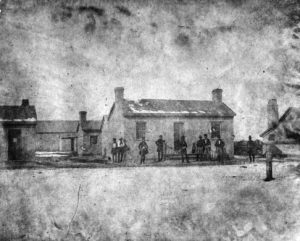Thomas G. Alexander
Utah, The Right Place
Condensed by Brittany Nelson
During the 1850s and 1860s relations between Salt Lake and Washington continued to deteriorate. On the one hand, Mormons still wanted to be masters in their own house; on the other, they sought to have advantageous economic links with the outside. Brigham Young had announced a policy in 1852 that people knew about (and in some cases practiced) for several years previously. This was the doctrine of plural marriage, that on the frontier an able-bodied man could seek to have two or more wives with the approval of the church. Back in the United States, of which Utah was a territory, a dim view was taken by Congress about plural marriages, and for the next 40 years every attempt by Utahns to seek statehood faltered on the shoals of polygamy.
In fact, this development and other misunderstandings between Salt Lake City and Washington led to the “Utah War” of 1857, in which the president dispatched an army under General Albert Sidney Johnston, later of Civil War fame, to occupy Mormon country. Johnston wisely chose not to camp in the center of Salt Lake and humiliate the Mormons, but set up Camp Floyd, 40 miles to the southwest, where his troops stayed for the next several years. The Mormons evacuated Salt Lake City and were ready to burn it down rather than let outsiders take their city, but this was avoided. In fact, Johnston’s army needed foodstuffs for the soldiers and feed for their horses, providing an economic windfall for the new settlers. The Utah War was the first instance where the Saints were called upon to shore their new frontier home with outsiders.

Camp Floyd
View of Commanding General’s quarters (middle building of headquarters range) from the east looking west. Taken on the J.H. Simpson Expedition, January, 1859. Credit: National Archives. Used in U.H.Q. Oct. 1960, Winter 1966. 77-F-L49-92 Used in “Utah Historical Quarterly” Oct. (1960), Winter (1966) Digital Image © 2008 Utah State Historical Society.
Mormons cheered when Johnston’s Army was recalled for the Civil War, but they soon were once again concerned with the coming of an army from the West, Patrick Connor’s California Volunteers. This army of surveillance arrived in 1861 and did put their tents just outside the city, founding what later became Fort Douglas. The Mormons were loyal to the Union, so there was no reason for military action, but Connor was convinced that Utah’s mountains held mineral wealth and released his troops from time to time to search for gold and silver. Only smaller mines were discovered by the troops, but their activity paved the way for others who also could see that Utah’s mountain ranges contained valuable ores awaiting energetic prospectors.
